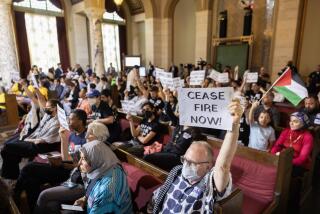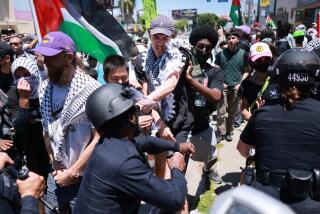Lower Manhattan denizens chafe over mosque debate
- Share via
Reporting from New York — Politicians have deemed the area around New York’s “ground zero” hallowed ground. Protesters have paraded signs proclaiming, “No sacrilege at holy ground,” and others have called it the site of a “sacred burial.”
And it’s true that the neighborhood, which many New Yorkers say is an inappropriate site for a mosque, hosts inescapable reminders of the Sept. 11 attacks that felled the twin towers of the former World Trade Center and killed nearly 3,000 people.
Some reminders are more overt. Along the perimeter of the former towers site, there are a tribute center and a makeshift shrine with candles and flowers. Tourists can visit a museum dedicated to the attack. And of course, there’s the ever-present construction on a new tower.
But the area also looks like any other Manhattan neighborhood, one on the rebound dotted with bodegas and bars. Though it’s been the focus of a national debate over a proposed Islamic community center and mosque, the neighborhood — the fastest-growing on the island — isn’t just trying to recover from 9/11; it’s also trying to reinvent itself.
Across the street from the former towers site, there’s a two-story Burger King where visitors can get a clear glimpse into the new construction. There are the department store Century 21, which sells everything from sunglasses to shoes, and the St. Paul’s Chapel, which amazingly sustained no damage in the attacks, and the church’s graveyard. The city’s oldest parish, St. Peter’s Roman Catholic Church, is a block away. A mosque is four blocks away and a strip club is two.
Like every part of the city, it has its morning and evening surge of commuters, with suited office workers dashing to the underground trains. It has ongoing construction — the workers eating lunches from brown paper sacks — and touristy knickknacks — Statue of Liberty figurines, “I ♥ NY” backpacks — for sale on sidewalks.
Mark Scherzer, a lawyer, said he has seen the neighborhood make the transition from warehouses and office buildings to a fully functioning residential area complete with dry cleaners and high- and low-end restaurants. After Sept. 11, the neighborhood looked as it did when he arrived three decades ago, struggling to get its footing.
“There was nothing,” he said. “There was no life.”
And any construction is good construction, said Scherzer, who welcomes the community center. Scherzer left the area after the attack — pieces of the World Trade Center broke his windows and landed on his apartment balcony — and didn’t return until January 2003.
“To see life coming back, that’s something we all crave,” he said.
John Bayles, associate editor of the neighborhood newspaper, said any debate on the mosque should focus on property rights and neighborhood revival. “Lower Manhattan is in the middle of this huge rebuilding process,” he said. “Any sort of community center is nothing but positive for the community.”
Bayles’ newspaper, the Downtown Express, has published several editorials supporting the community center, called Park51. The paper called it a “crucial thread in the diverse and accepting fabric of the Lower Manhattan neighborhood.”
Terry Wiederlight, owner of the Fountain Pen Hospital, a pen shop, also remembers when the area used to be full of “junk stores.” Now it’s lined with restaurants and a smoke shop.
The business presence lost after Sept. 11 needs to be revived, Wiederlight said, but the types of businesses haven’t been regulated. A strip club called New York Dolls is two blocks from the former Twin Towers site.
Four blocks away is the Off-Track Betting Corp. of Lower Manhattan. On a recent drizzly day, Andy Huguet smoked a cigarette as he pondered his bets. Huguet, who comes to the area only to gamble, said the proposed Islamic community center is coming too soon and the mosque issue is sensitive. The neighborhood remains fragile.
“It’s too delicate,” said Huguet, who lives across the East River in Brooklyn.
Many New Yorkers agree. Polls have shown that the majority of New Yorkers oppose a mosque so close. Still, the project does have its supporters.
At the Dakota Roadhouse bar, next door to the proposed site of the community center, Jeffrey LeFrancois cradled an after-work cocktail. LeFrancois, who used to live in the area but now works there, said the mosque is a local issue, one that should be hashed out in the neighborhood. He said too many politicians are using it as a way to gain votes.
“Most of the opposition is coming from outside the city of New York,” he said, adding that people are already praying at the proposed community center space.
Indeed, the area already has an Islamic presence. Within a one-mile radius of the ZIP Code 10007, there are 17 restaurants that serve food in accordance with Islamic dietary laws.
Four blocks from the 9/11 site, Masjid Manhattan has been operating since 1970. The mosque’s website said city, state and federal employees, as well as financial district workers, come by daily for prayer.
TriBeCa, known for high-rise lofts and fancy cafes, is also home to Masjid al-Farah, a small mosque near bars and liquor stores 12 blocks from the former World Trade Center site.
Both mosques are full, especially during weekly and daily prayers, said Ameena Meer, a creative director who belongs to Masjid al-Farah.
“Basically there’s so many people who don’t have a place to pray that they pray on the street on cardboard,” said Meer, a Muslim who has lived in the neighborhood for 17 years. She said she’s seen recent growth in the area’s Muslim population.
People in the neighborhood need the resources the community center could provide, such as a library, 500-seat performing arts space, pool and prayer space, she said. If the area is hallowed ground, Meer said, then people are already praying on it.
“If it’s a symbol, then where does the hallowed ground end?” she said.
Ray Tahlov still believes the area around his barbershop, four blocks away from the 9/11 site, is special. There aren’t any reminders of the attacks on his block: no flowers, no candles. A nail salon shares his block, along with a saloon.
Still, Tahlov said, “This place is holy.”
nicole.santacruz@latimes.com
More to Read
Sign up for Essential California
The most important California stories and recommendations in your inbox every morning.
You may occasionally receive promotional content from the Los Angeles Times.











